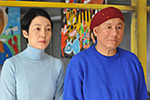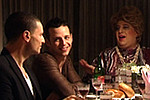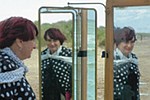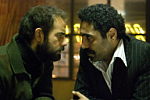 Shadows off the beaten path
Shadows off the beaten pathTHE BEACHES OF AGNES | THE MARKET
< < F O R E I G N > >
last update 27.Aug.09
See also: SHADOWS FILM FESTIVAL
 R E V I E W B Y R I C H C L I N E
R E V I E W B Y R I C H C L I N E
with Beat Takeshi, Kanako Higuchi, Yurei Yanagi, Reiko Yoshioka, Kumiko Aso, Eri Tokunaga, Akira Nakao, Masato Ibu, Mariko Tsutsui, Ren Osugi, Aya Enjoji, Nao Omori

release Jpn 20.Sep.08,
UK Oct.08 lff
08/Japan 1h59
VENICE FILM FEST TORONTO FILM FEST

 With another ambitious and decidedly off-centre film, Kitano continues to examine the nature of art. A blackly comical approach keeps us watching, but the stylised quirkiness prevents the film from engaging us emotionally.
With another ambitious and decidedly off-centre film, Kitano continues to examine the nature of art. A blackly comical approach keeps us watching, but the stylised quirkiness prevents the film from engaging us emotionally.
Machisu (Yoshioka) is the spoiled son of wealthy art-collecting parents. After their untimely death, he grows up in an orphanage and as a teen (now Yanagi) develops his skill as a painter but struggles to find a style that's his own. Everything seems to be imitation or repetition, but Sachiko (Aso) loves his work and offers to help in any way she can, earning money while he paints. They get married, and years later (now played by Takeshi and Higuchi), Machisu is still painting up a storm but no closer to success.
Kitano is examining the elusive nature of art, and as Machisu desperately seeks his own voice, a real sense of accomplishment seems to get further away. Even as his family falls apart around him--Sachiko leaves him and their daughter (Tokunaga) becomes a prostitute--he continues to chase his destiny, battling against the artificial rules set up by a corrupt industry, as embodied by the narrow-minded dealer who refuses to buy Machisu's paintings.
This is pretty heavy stuff, really, and Kitano is saying something profound about the nature of the artist and how artists relate to the world at large. Fortunately, he accompanies this with colourfully lurid production values and a continuous stream of ironic dark humour that examines the themes from all kinds of angles. The art business gets a pretty thorough skewering, from the drawings of children to accidental paintings, plus an interlude in which Machisu's gang of art-school jokers indulge in hilarious discussions and performance projects, challenging the status quo in theory only.
Hilarious observations along the way continually twist and turn the ideas. The most amusing sequence finds Machisu and Sachiko hitting the streets to cover the walls in artistic graffiti. All of this is performed in Kitano's typically deadpan style, with emotions only showing through the smallest of facial tics. But it's an entertaining and provocative comment on how success is always just out of reach, even though it doesn't seem to be moving very quickly.
22.Oct.08 lff
 R E V I E W B Y R I C H C L I N E
R E V I E W B Y R I C H C L I N E
prd Eitan Reuven
with Tomer Ilan, Guy Zo-Aretz, Yiftach Mizrahi, Yuval Raz, Lucy Dubinchik, Liat Akta, Ofer Regirer, Oshri Sahar, Noam Huberman, Shirly Solomon, Dvir Benedek, Rivka Neuman

release US 28.Nov.08,
UK 31.Aug.09 dvd
08/Israel 1h52
 Like a TV series condensed into a movie, this Israeli gay drama has too many characters and situations to coalesce into anything meaningful. But there are some strong stories in here, plus and people we can identify with.
Like a TV series condensed into a movie, this Israeli gay drama has too many characters and situations to coalesce into anything meaningful. But there are some strong stories in here, plus and people we can identify with.
After a 10-minute prologue featuring the empty, rampant sex life of businessman Boaz (Regirer), the story jumps ahead three years and we meet Omer (Ilan), a shy librarian who'd really like to find Mr Right while his sister Shirley (Dubinchik) is having a fling with Ms Right Now (Akta). When Omer meets the journalist Ronen (Zo-Aretz), he finally finds someone with depth. But Omer doesn't know Ronen is the guy his friend Miki (Raz) has just fallen for. Meanwhile, Omer meets the young dancer Danny (Mizrahi), who shares a flat with Boaz.
Yes, these entwined relationships suggest that Tel Aviv's gay community is extremely small! Even so, it takes awhile before we begin to know (and differentiate) the characters, partly because most of them are stereotypes. The only ones who emerge with any sense of an internal life are Omer and Ronen, and they're nicely underplayed by Ilan and Zo-Aretz with a quiet zing of chemistry. Mizrahi gives Danny a nice complexity, although we barely get to know him.
After the fairly explicit opening, the film becomes strangely talky, with several random subplots that play out through long conversations. Extended screen time is given to an utterly irrelevant story Ronen is working on about alien abductees, plus Shirley's attempt to plan a holiday in Antarctica. Both of these sidelines seem to carry some sort of deep symbolism, but filmmaker Hochner never makes this clear. And why Omer and Shirley's mother is played by a man in drag (Huberman) is never explained at all.
Hochner also seems to be having trouble cramming all of this into a movie, as scenes feel fragmented and chopped short, while some characters are barely on screen long enough to register. Even though there are very strong moments here and there, this approach leaves the film without a central point of view and no discernible structure. Basically, the script needed to be shorn of the indulgent sideroads and given some focus.
25.Aug.09
 R E V I E W B Y R I C H C L I N E
R E V I E W B Y R I C H C L I N E Les Plages d’Agnès
Les Plages d’Agnès
with Agnès Varda, Mathieu Demy, Rosalie Varda, Yolande Moreau, Jane Birkin, Harrison Ford, Charlotte Gainsbourg, Jim McBride, Sandrine Bonnaire, Catherine Deneuve, Zalman King, Patricia Knop
 release US 1.Jun.09,
release US 1.Jun.09, UK 2.Oct.09
08/France 1h51
VENICE FILM FEST TORONTO FILM FEST

 Varda brings a playful attitude to this whimsical stroll through her life, telling stories and showing photos and clips that chronicle both her career and her personal life. It meanders a bit, but it's also thoroughly engaging.
Varda brings a playful attitude to this whimsical stroll through her life, telling stories and showing photos and clips that chronicle both her career and her personal life. It meanders a bit, but it's also thoroughly engaging.
As she celebrates her 80th birthday, the iconic French filmmaker compiles an impressionistic collage of photographs, home movies, new scenes and clips from the classic films she had a hand in. She recounts her career alongside Godard and the Nouvelle Vague, and links her memories together with beaches from near her birthplace in Belgium to Los Angeles by way of Cuba and Cannes. She also installs a beach on a Paris street, occupied by female members of her staff.
We expect the witty visual gags and inventive, beautiful camera work, but what's surprising is Varda's charming presence on screen. She comments that she normally films others: "Here I am playing a little old lady," she says. "It's time to be me." And what emerges along the way is a lovely connection of past and present, matching old and new footage and themes while making small observations. Much of this is like performance art, but it's also deeply personal as she assembles clips from her films that piece together her own life story.
The idea is that it takes a variety of fragments to assemble a true picture of someone, and Varda's life has been lived through the cinema. But everything she looks at leads her back to Jacques Demy, and ultimately to her children and grandchildren. Her footage of Demy as he was dying is profoundly touching ("My only option as a filmmaker was to film him"), as are scenes with her children Mathieu and Rosalie.
Varda's playful personality comes through in the film's structure, which is carefully planned out but feels organic and refreshingly oblique. The gentle pace and warm tone are punctuated by outrageously cheeky scenes that include a full circus trapeze act on a beach or clips of Paris during the war. In the end, the film is an indulgent but beautiful love letter to future generations, as Varda notes that "while I live, I remember."
28.Oct.08 lff
 R E V I E W B Y R I C H C L I N E
R E V I E W B Y R I C H C L I N E Pazar: Bir Ticaret Masali
Pazar: Bir Ticaret Masali
with Tayanç Ayaydin, Genco Erkal, Senay Aydin, Hakan Sahin, Rojin Ulker, Sertel Ugur, Seval Bozbay, Nilüfer Alptekin, Kubilay Tunçer, Kamil Acar, Ozlem Baskaya, Ufuk Asar
 release UK 16.Apr.10
release UK 16.Apr.1008/Turkey 1h33

 British director Hopkins travels to the eastern border of Turkey for this engaging story of a man trying to make use of the free market system without losing his soul. It's beautifully shot and acted with real wit and energy.
British director Hopkins travels to the eastern border of Turkey for this engaging story of a man trying to make use of the free market system without losing his soul. It's beautifully shot and acted with real wit and energy.
Mihram (Ayaydin) makes a living buying and selling things. But his wife (Aydin) is worried about his business methods. She cheers up when she hears that he's taken a job without payment for a local charity hospital, travelling into Azerbaijan to buy medicine. But carrying cash for the purchase is too tempting, and he starts wheeling and dealing to earn a bit on the side as he makes his way across the landscape. Eventually, he links up with his Uncle Fazil (Erkal), who struggles to keep him on the straight and narrow.
The film vividly demonstrates how money can be a common language from one culture to another, and Hopkins weaves in some potent themes along the way, not least Mihram's commitment to his faith, as he continually makes promises to God that he will be a good person as soon as he makes this last chunk of cash. The dialog is realistically snappy and sarcastic, bringing out the personalities of the characters and allowing the actors to create people we can readily identify with.
But even as we're laughing at the funny things these people say and the ridiculous corners Mihram gets himself into, there's a pointed edge to this film that keeps us thinking. Essentially, this is a story about the insidious subtlety of greed and how it erodes our morality so quietly that we hardly notice. On a relatively small scale like Mihram's tale, there are both comical and tragic implications, but when we think that the whole world operates like this, things become rather more momentous.
These are issues we think about as we watch Hopkins' simple, contained story, which is skilfully shot in colourful locations and edited with wit and insight. And while the film gives us an intriguing perspective on the bigger picture, it's also a beautifully assembled story about the fact that while perhaps everything has its price, there are also some things that simply aren't for sale.
16.Oct.08 lff


See also: SHADOWS FILM FESTIVAL
© 2009 by Rich Cline, Shadows
on the Wall